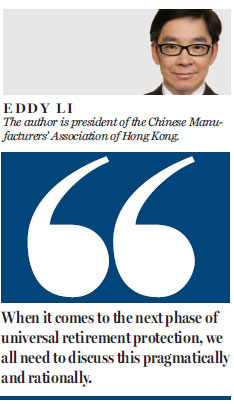We have to find consensus on retirement protection in HK
Updated: 2016-01-08 08:13
By Eddy Li(HK Edition)
|
|||||||
A retirement protection consultation was launched in Hong Kong before the 2015 Christmas holidays. The policy is very significant and important, so the Commission on Poverty provided two simulation options for public discussion and extended the consultation time from the traditional three months to half a year. Because of the policy's scale and importance, it is natural that the government would so robustly encourage the public to express their opinions.
The problems associated with growing aging societies are, of course, part of an international trend. The population of the elderly inevitably is increasing everywhere. According to the Census and Statistics Department, the over-65 population in Hong Kong reached 1.06 million in 2014, accounting for 14.7 percent of all Hong Kong people. The percentage is estimated to rise to 36 percent in 2064. This section of the population can only spend their remaining years in comfort if they have government support. So the problem, now, is not whether to implement retirement protection, but exactly how this should be done.
The government, in its consultation, has offered two options - "regardless of rich or poor" and "based on economic needs"- for the public's reference. While the former is based on University of Hong Kong Professor Nelson Chow Wing-sun's mid-2014 report commissioned by the government on retirement protection, the latter is a proposal developed by the government.
In August 2014, Chow presented the findings of his study on "Future Development of Retirement Protection in Hong Kong", suggesting a monthly pension of HK$3,000 for all over-65s without any means test - with funds provided by the SAR government, employers and employees - to replace the current Old Age Living Allowance and Old Age Allowance (fruit money). When interviewed, he indicated that discussion on retirement protection would be a waste of time if everyone is unwilling to put more time and resources into it.
In my comments on the proposal then, while acknowledging the good intentions of Chow, I did raise two arguments: First, resources cannot be allocated reasonably without a proper means test; second, if a payroll tax to pay for a pension is introduced, would it be fair for everyone to receive the same HK$3,000 payment regardless of their contribution?
In Chow's 2015 proposal, he raised the age threshold for receiving this pension from 65 to 70, and revised the resource of funds from a payroll tax to one which is paid out of government money. Both of Chow's proposals have failed to win the support of most people in Hong Kong. This is because they have been developed from a purely academic perspective. But the government, which has to factor in fiscal constraints and responsibilities, has put forward another proposal "based on economic needs". Regarding this proposal, many people - mainly academics - have argued that the SAR government is promoting a wrong idea - that retirement protection is a welfare payment. But in fact it really should be seen as the redistribution of resources.
That the SAR only provides two options in its consultation does not mean we can only choose either of them. They are just there to provide different points of view and data for reference to help develop a workable plan which the public can generally agree on.
Hong Kong has wrestled with the problem of universal retirement protection for almost three decades. In order to help deal with this challenge, the SAR government introduced the Mandatory Provident Fund Scheme in 2000. Although the rate of return from the scheme is far from satisfactory, it is nevertheless the first step toward some sort of system of retirement protection. Therefore, when it comes to the next phase of universal retirement protection, we all need to discuss this pragmatically and rationally.

(HK Edition 01/08/2016 page10)